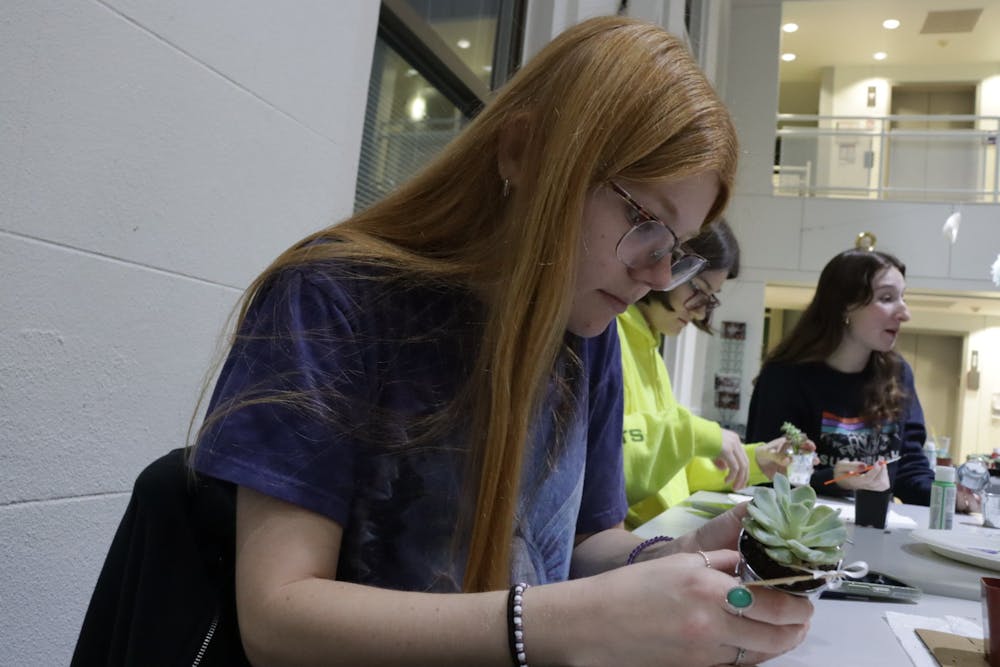From the Newsstands: This story appeared in The Eagle's December 2023 print edition. You can find the digital version here.
Editor’s Note: This story contains references to disordered eating.
In a sea of college clubs vying for her attention at American University’s club fair, Katherine Mena found a community that she had longed for in high school: the Body Neutrality Coalition.
The club offered Mena, a sophomore in the School of Public Affairs, an opportunity to engage with a supportive community about eating disorders, something she experienced in high school.
“I saw the club and I was really interested in what I could do to provide in that community,” Mena said.
The Coalition aims to support students in recovering from eating disorders, appreciate their bodies, raise awareness of eating disorders and educate members about how body image intersects with different parts of life, according to Coalition President Isabella Brooke, a senior in the College of Arts and Sciences.
Their goal is to help students feel less alone as eating becomes more of a social activity in college, according to Brooke. The Coalition meets this challenge by hosting events, such as movie screenings and planter paintings.
“It’s very community-oriented,” Brooke said. “Everyone’s voices hold equal weight and we want to keep expanding into more diverse spaces so we can continue to hear more and more perspectives.”
The Coalition also aims to educate on topics including fatphobia, obesity and body mass index through research and presentations. According to Brooke, presenters often emphasize why factors like stress, bullying and socializing can make students feel bad about what they eat and how they look.
Leaders of the Coalition also invite members to present on topics related to the body, food or well-being, according to Coalition Secretary Lindsey Robbins, a senior in CAS.
“If anybody who’s a part of the club has something related that they want to do a presentation on, we absolutely give them the floor,” Robbins said.
Em Cicala, a sophomore in CAS, took that opportunity last year. Cicala gave a presentation on the intersection between disabilities and body image. Cicala said the presentation and the other topics of discussion inspired them to think about weight, body image and medicine from a new perspective.
“Your body doesn’t have to be [a] skinny-model person or go to the gym to get jacked,” Cicala said. “It can just be whatever you want it to be.”
Newer members, like Cicala, have also shown particular concern over AU’s stress-inducing culture and its impact on eating, Brooke said.
“They are very, very bothered or triggered by students being like, ‘I’ve had so much work I haven’t had time to eat,’” Brooke said.
The sentiment validates a diet culture that ultimately negatively affects attitudes around food and body image, Brooke said. Students are also more susceptible to following diets to an extreme degree as they start college, which is dangerous, Robbins said.
“[If] there’s a really big diet culture issue for some colleges, especially as it relates to drinking,” Robbins said. “It’s super easy to let that diet culture influence how you’re eating and how you’re making choices around food.”
The Coalition emphasizes that everyone’s voice should be heard in a respectful manner at each meeting, according to Ella Doxsee, vice president of the Coalition and a sophomore in CAS.
Comparing details about diets, calories, weight or body size can upset people with eating disorders, Doxsee said. Instead, the club focuses on education to help students appreciate their bodies.
“We’re leading with love and compassion here,” she said. “Absolutely share your story and your frustration, but we have to be super mindful that what we’re saying isn’t going to encourage someone’s disordered habits.”
For Coalition member Lorena Martinez, a sophomore in the Kogod School of Business and School of Communication, a lack of resources for students with eating disorders at AU makes the Coalition’s community all the more important.
“I think it’s good to open a dialogue when people feel comfortable,” Martinez said. “Hearing other people’s experiences or stories might make someone feel less alone or might make someone feel like they can reach out for support.”
Brooke said she is happy to lead an organization offering support.
“It just makes my heart so full that it’s continuing and that it’s spreading,” Brooke said.
For Robbins, joining the Coalition helped her mental well-being. She can now help others, she said.
“Getting to give that to someone else or be a part of that for someone else is such a good feeling,” Robbins said.
For Doxsee, helping others in their healing processes is a reminder to help herself.
“In those moments where it feels hard and I feel diet-culture rhetoric slipping through, I’m able to remind myself I am on the [executive board] of this club, so if I’m going to talk the talk, I have to walk the walk,” Doxsee said. “I am accountable to these people to remain in a good headspace so that I can continue to show up and dismantle diet culture and continue to foster this really amazing community.”
After spotting the Coalition at the club fair, Mena said she joined to see how she could provide for the community. Over a month later, Mena found a way to help out: by showing up to the Coalition’s pot painting event.
“We’re all here having fun decorating pot plants and throughout it all, we know that we have each other’s back,” Mena said.
This article was edited by Maria Tedesco, Patricia McGee and Abigail Pritchard. Copy editing done by Isabelle Kravis, Luna Jinks and Emilia Rodriguez.





